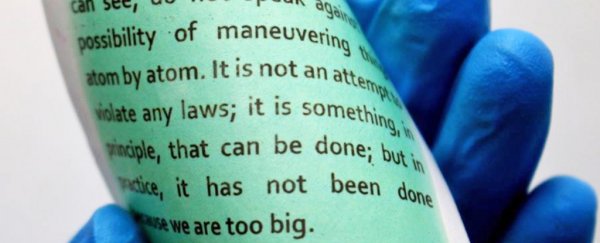A new method for printing on paper using light promises to be much cheaper, and easier on the environment than the traditional ink-based printing we're used to.
Scientists have developed a special nanoparticle coating that's easy to apply to normal paper and changes colour when ultraviolet (UV) light shines on it. The colour change can be reversed when the coating is heated to 120 degrees Celsius (248 degrees Fahrenheit), and allows for up to 80 rewrites.
The team of researchers from the US and China say that their new high-resolution light printing technique could be used everywhere from newspapers to labels, saving on the cost of ink and paper, and on the environmental cost of their recycling and disposing.
The special light-printable paper "has the same feel and appearance as conventional paper, but can be printed and erased repeatedly without the need for additional ink" one of the research team, Yadong Yin from the University of California, Riverside, told Phys.org.
"Our work is believed to have enormous economic and environmental merits to modern society."
Two types of nanoparticle are combined for the new coating: Prussian blue, a blue pigment used in paints that turns colourless when it gains electrons, and titanium dioxide (TiO2), a photocatalytic material that speeds up chemical reactions in response to UV light.
 Credit: Wang et al, American Chemical Society
Credit: Wang et al, American Chemical Society
Mix these two substances together and you get a coating that's solid blue. Add some UV light, and the TiO2 particles are excited, releasing electrons that turn the Prussian blue pigment colourless. The method essentially 'prints' the blank parts of the page.
The scientists say the printing stays in place on the page for at least five days before slowly fading back to blue, but that fading process can be sped up if heat is applied.
As the coating can be quickly applied to normal paper with spraying or soaking, the researchers expect the technology to be cheap enough to be useful when made on a commercial scale. Add to that being able to use each page 80 times or more, with no ink to buy, and it's easy to see the appeal.
And it won't just be businesses taking advantage of the reduced costs, because the environment benefits too: up to 40 percent of waste in the US is discarded paper, with around 68 million trees cut down to keep our office stationery cupboards stocked.
This isn't the first time scientists have experimented with ultraviolet light and chemical printing, and Yadong Yin himself showed off a prototype of this technology in December 2014 – though back then it could only be rewritten 20 times, and wasn't as easy to apply to conventional paper.
The team of researchers says their latest version of light printing is more stable, more straightforward, and cheaper than anything that's gone before. The next step is to try and develop it into a practical printing system.
"Our immediate next step is to construct a laser printer to work with this rewritable paper to enable fast printing," Yin told Phys.org. "We will also look into effective methods for realizing full-colour printing."
The findings have been published in Nano Letters.
